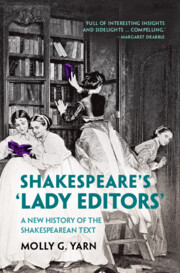‘Fascinating insights into a hitherto unacknowledged contribution to our understanding of Shakespeare.’
Greg Doran - Artistic Director of the RSC
‘I have read Molly Yarn’s book with much pleasure and profit. It is full of interesting insights and sidelights and revealing sociological commentary. It is diligently and scrupulously researched, with a compelling narrative that brings together biography and bibliography (I love the phrase ‘bio-bibliography’) and foregrounds many hard working women editors, some of them leading multiple lives, who have been hitherto overlooked in the history of Shakespeare editing and criticism. She is not afraid, in her own word, to disclose the ‘intimate’ discoveries she has made, about herself and her subjects while working on this timely topic. It’s an important and very readable contribution to Shakespeare studies.’
Margaret Drabble
‘This is much more than a biography of forgotten and undervalued female editors of Shakespeare in the 19th and 20th centuries. It is a biography of what we value (or decide not to value ) in textual studies; it is a gripping account of female education in the United States and the United Kingdom; it is a chronicle of social circles and patronage; and it is a collection of deftly-told stories. Together these ingredients make for a compelling and illuminating read.'
Laurie Maguire - University of Oxford
‘Few scholarly studies combine original research that opens a whole new field of enquiry and fascinates the non-specialist reader with a topic that is both relatable and deeply moving. Shakespeare’s ‘Lady Editors’ is one of them. Molly Yarn embarked on her search for women editors of Shakespeare, assuming she would find a handful beyond the few ‘household’ names known to Shakespeare specialists. In fact, her careful archival work has revealed the names, biographies, and editorial achievements of sixty-nine women who edited Shakespeare in the UK and the US before 1950. Readers of Shakespeare’s ‘Lady Editors’ will find in this book the first sustained critical assessment of a small army of women, whose editorial labour was quite literally lost, due to the disqualifying effect of their gender. Yarn does not only recover their labour but shows how influential it is in complementing and redefining our understanding of the official editorial tradition of Shakespeare.’
Sonia Massai - King’s College London
‘Shakespeare's 'Lady Editors' is a quite wonderful book. With extraordinary skill Molly Yarn has retrieved the history of the work of generations of women editors of Shakespeare, the story of whose labours has largely been lost to scholarly history. Yarn's scholarship is deeply impressive, but it is worn lightly and her book is energetically written, immensely readable and deeply engaging. The volume is an indispensable resource for anyone interested in the history of Shakespeare editing and the over-looked role of generations of women scholars in helping to construct and reframe the Shakespeare text. A thoroughly excellent volume.’
Andrew Murphy - Trinity College Dublin
‘Molly G. Yarn’s meticulously researched monograph considers the numerous women who edited Shakespeare in the nineteenth and early twentieth centuries, and thus shaped the history of Shakespearian transmission.’
Georgina Wilson
Source: Times Literary Supplement
‘This impressive study offers many bonus riches: insights into developments in women’s higher education and their effects on women’s scholarship; an examination of the role of editing itself; and extensive appendixes that finally give women editors credit where credit is due … Highly recommended.’
M. S. LoMonaco
Source: Choice
‘Molly Yarn’s new book is an excellent example of the kind of new, historicist, theoretically inflected research that makes this field so exciting at the moment. … This is the kind of scholarship that we need at the moment, and that is being produced by a new generation of scholars: original, thoughtful, and accessible.’
Paul Salzman
Source: Parergon
‘… one of the best books published on Shakespeare in the last decade.'
Katherine Scheil
Source: Shakespeare Quarterly



